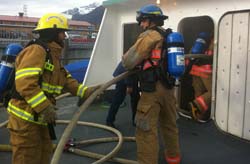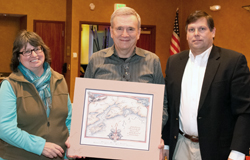The Council’s Port Operations and Vessel Traffic Systems (POVTS) committee members have been aware of severe historical wind events that have caused the terminal’s operators to halt transfer of oil to a tanker because the required containment boom around the tanker could not be maintained. This boom is required in order to contain any oil that might be spilled during transfer of cargo. High winds and the resulting waves can adversely affect a boom.
Booms placed around tankers as they are being loaded presents a first line of defense in preventing the spread of oil in an inadvertent spill. Heavy weather limits the effectiveness of booms and impacts loading operations. Developing better information concerning the relationship between weather and loading, with a focus on potential mitigation measures can only help to improve safety during loading operations.
The report titled “Wave induced Delays in Cargo Transfer at the Valdez Marine Terminal – Berth 4” by Marie Kartezhnikova, Orson Smith and Peter Olsson is a preliminary investigation for the council of wave-related difficulties in boom deployment and effectiveness at Berth 4 of the VMT.
2012 Wave-induced Delays In Cargo Transfer At Valdez Marine Terminal Berth 4
The report was, in part, an academic exercise. Kartezhnikova was a graduate student enrolled in the University of Alaska Anchorage, studying the design of ports and harbors. Smith is the instructor of that course and a member of the council’s POVTS committee. Olsson is the Alaska State Climatologist at the UAA’s Environment and Natural Resources Institute. Olsson provided expert opinion on wind climate and origins of extreme wind events at the site. None of the authors were compensated for this work. Council financial support was limited to travel expenses for a site visit in October 2012.
Kartezhnikova presented the findings in this report at the council’s Science Night event on December 13, 2012.

